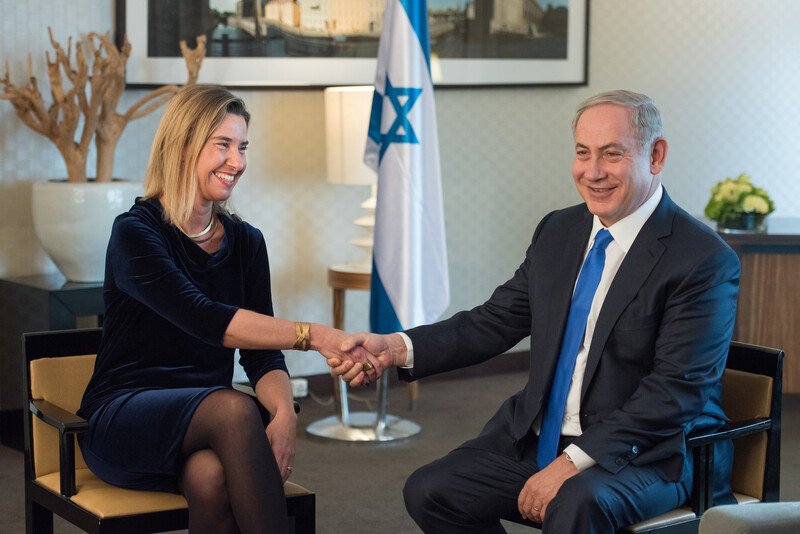Power Suits 18 November 2019

Federica Mogherini has constantly indulged Benjamin Netanyahu during her time as EU foreign policy chief. (European Union)
Federica Mogherini is closing her term as the European Union’s foreign policy chief in much the same way that she kicked it off: by pandering to Israel.
Shortly after taking up her post in 2014, Mogherini paid a visit to Benjamin Netanyahu. She assured the Israeli prime minister that he could “count on the European Union” to build a “new start.”
Mogherini was vague about what the “new start” would entail. Nonetheless, she has brought some degree of innovation – though not in a positive sense – to international relations.
Under her leadership, the EU uses far weaker language than previously when alluding to grave breaches of human rights.
Back in February 2001, the official EU line was that it “deplores” how Israel was carrying out extrajudicial executions. But when Israel resorted to an extrajudicial execution in November 2019, Mogherini’s team merely referred to an “operation” without expressing any criticism.
The “operation” resulted in the deaths of the Islamic Jihad commander Baha Abu al-Ata and his wife. By declining to denounce Israel’s blatantly unlawful behavior, Mogherini’s team was effectively approving it.Snuggling up
Mogherini has been in regular contact with Israel’s top politicians over the past five years. When Netanyahu’s Likud became the biggest party in a 2015 election, Mogherini was quick to congratulate him.
Her message was that she regarded Israel’s relationship with the European Union as “mutually beneficial.”
Such snuggling up to the apartheid state displays a contempt for demands by Palestinians that they be granted justice and equality.
Perhaps the most concise articulation of those demands is the 2005 Palestinian call for boycott, divestment and sanctions against Israel. Following a 2016 confab with Netanyahu, Mogherini stressed her “firm rejection” of the BDS call.
To be fair, Mogherini has occasionally spoken some truth.
In 2017, Israel’s parliament, the Knesset, approved a bill to “regularize” the theft of Palestinian land by formally approving settlements in the occupied West Bank that had hitherto been deemed illegal even by Israel.
Mogherini issued an uncharacteristically frank reprimand. If the legislation came into effect, it “would further entrench a one-state reality of unequal rights,” she complained.
For once, she accurately identified the problem which must be solved.
Moral compass?
At grassroots level, many Palestinians are seeking to swap the “one-state reality of unequal rights” for a one-state solution that guarantees equality.
Mogherini might have acknowledged the problem – however fleetingly – yet she has been dismissive of those seeking to end it.
Rather than advocating for genuine equality, she favors a two-state solution that would, in all probability, give Palestinians sovereignty over a mere sliver of their historic homeland. Mogherini has insisted “there is no alternative” to a two-state solution.
Reflecting on her term recently, Mogherini said “I am proud that we, Europeans, have never lost our compass” and have “always kept working to preserve and enable a negotiated two-state solution for Israel and Palestine.”
Thankfully she did not refer to the figurative navigational aid as a “moral compass.” For the EU’s stance on some key issues is amoral.
Since 30 March 2018, Israel has repeatedly attacked Gaza residents taking part in the Great March of Return. When protesters have been killed, Mogherini’s team has suggested that they were responsible for their own deaths.
Statements published by that team have claimed that some demonstrators acted violently, implying that is why they were shot.
Vital context has been omitted. The stones thrown by some protesters are no match for the exploding bullets or tear gas canisters fired at high velocity by Israeli snipers.
Besides, when did throwing a stone at a heavily-armed soldier become an offense punishable by death?
Hunt for euphemisms
A population under military occupation has a UN-mandated right to resist.
Apparently, it would be too much for Mogherini to accept that.
Her “new start” has involved a hunt for euphemisms.
It is no longer fashionable, she would have us believe, to label the situation in Gaza as a siege or a blockade. She prefers to call it a “closure.”
Mogherini and her team have been unfailingly courteous toward Israel. In their statements, the team asks Israel to “reconsider” planned demolitions of Palestinian homes.
Last year, Mogherini’s team even stated that it “expects” Israel to “reverse” decisions that would uproot Palestinians in the occupied West Bank. As usual, there was no threat of any penalty if Israel disregarded the EU’s ever-so-timid appeal.
Mogherini’s successor as EU foreign policy chief, Josep Borrell, may be more of a straight talker. As Spain’s foreign minister, Borrell was not prepared to dance with joy when Israel marked the 70th anniversary of its foundation during May 2018.
The celebrations were “covered in blood” because Israel had carried out a massacre in Gaza a few days earlier, he wrote in an opinion piece.
Will Borrell behave any differently to Mogherini when he takes up his new post?
His past willingness to excoriate Israel does not make him a valiant defender of human rights. On the contrary, he has been part of a government which has sought to crush Catalonia’s independence movement in quite a brutal manner.
Borrell himself has made spurious allegations against prominent figures in that movement. He has gone so far as publishing a classified document in an attempt to besmirch one such figure.
Being the foreign minister for Spain is not the same as representing the entire EU, which now includes 28 countries. Collectively, their governments have indulged Israel in all kinds of ways.
Borrell might usher in a few small changes but more than likely the indulgence will continue. It is vital, then, that ordinary Europeans do what political leaders won’t: boycott and isolate Israel.





